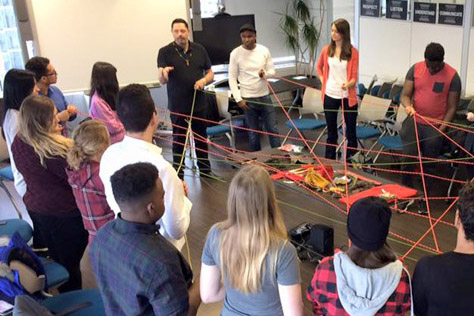
Contact Information
Poem (Forward)
We are youth in care and this is part of our story
Some may say it’s our “#Trajectory”
We know that some policies are pre-existent
However, from experience they remain inconsistent
We’re representing children from every age range
We using our voice to implement #FundamentalChange
Please show me I mean more than a temporary smile
Remind me that I’m important and that I’m worthwhile
We may bring baggage but don’t give up on us
It will take time to open up and trust
We make mistakes like every human being
But please look beyond the behaviour you’re seeing
We know it’s not simple to do what you do
But just know there are supports there for you
Times will get tough and we may disagree
But please keep in mind the effects restraints have on me
Communication first, law enforcement last
We’re really not criminals, we just had to grow up fast
Accessibility is beyond what you see
Sometimes it’s about accepting our individuality
Please implement structure but include us in the plan
Be open to flexibility and we’ll be your biggest fan
So, if you’re listening and you’re still on the fence
Read between the lines, this is just common sense!

Executive Summary
Our Message
- Children and youth are supported to develop skills and have resources needed to live independently and mature into adulthood.
- Children and youth are supported to develop meaningful community relation-ships.
- We are all unique and different and should be acknowledged and treated as individuals in every aspect of our lives.
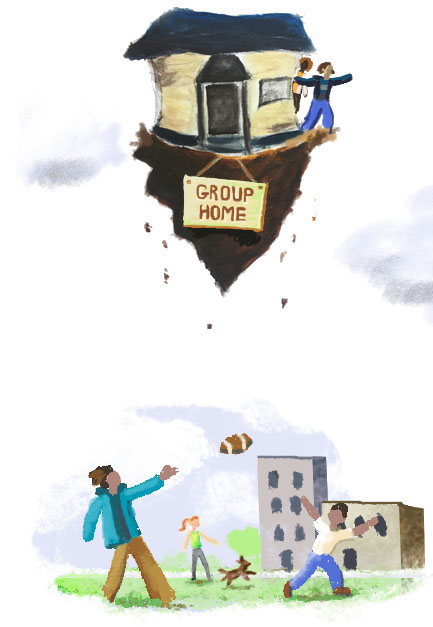
These past 6 months, we explored three key themes: Quality of Care, Continuity of Care and Youth Voice. Our input into these themes has been organized into six key domains.
Our Domains
-
Voice, Rights and Communication: Youth have a voice in everything that affects them. Their rights should be respected and enforced by those who provide them with care. Service providers need to support this voice and should be regularly reviewed and evaluated to ensure the supports and opportunities needed for young people to thrive are available to them. Children and youth have a voice that needs to be respected and heard in all scenarios. Communication is vital and mandatory when it comes to engaging with children and youth especially in the residential care system.
-
Homes and Ongoing Support: It is important to outline what needs to be in place in order for youth to thrive. Many of the things needed for children and youth in care to succeed are interdependent therefore agencies and organiza-tions need to have integrated and a multidisciplinary approach when it comes to providing care. Ongoing support is necessary to ensure that children and youth are set up for success.
-
Individual Plans and Fulfillment: Embrace individuality and not a one size fits all mentality. We want to make sure that the diversity of children and youth is tak-en into account when supporting them to thrive. The system should be further customized to meet individual children and youth’s needs. Children and youth should be supported to make their own decisions and these decisions should be respected.
-
Belonging, Relationships and Accepting Environments: Promote stable rela-tionships that are maintained by all people involved in the lives of the child or youth, especially those initiated by a young person. Build safe, welcoming and comfortable environments.
-
Identity and Culturally Relevant Care: Culture is essential to a person and the way in which they live their lives; someone’s culture directly contributes to their identity and lack of culturally relevant care or cultural knowledge can lead to identity issues and a lack of self-esteem. Culturally relevant care is an important component of ensuring the quality of care provided to children and youth is top tier. Children and youth need to be able to freely express and embody the culture which they identify with. Service providers need to partake in culturally relevant training. Most importantly, children and youth need to be provided with the supports and resources that they need in order to maintain and nourish relationships with their cultural communities. Opportunities must be presented to develop community, culture and identity through a network of long-term relationships.
-
Service Providers and Caregivers: Service providers and caregivers have the most contact with some of the most vulnerable populations of children and youth. It is crucial to ensure that they carry out their jobs properly. Stricter re-quirements and educational qualifications need to be put in place for those who work with the children and youth. Service providers and caregivers need to be qualified and held to the highest standard so they know how to properly care for the children and youth and don’t end up causing harm. Positive relationships between the service providers and the children and youth are critical when ensuring the children and youth’s experience in care is a positive one.
A consistent theme that emerged in all of our discussions was the need for accountability across all domains. Our MCYS partners were often surprised to hear that existing policies are not being followed. We, therefore want to make sure that everyone knows how important accountability is to us.
Accountability: It is what transforms ideas from words on a piece of paper to action. It means ensuring:
- That service providers are trained properly and extensively. They work with some of the most vulnerable populations so they should be kept to the highest standard.
- That services are consistent across Ontario and the various sectors. This includes the ministries and agencies that support youth in residential care.
- That youth have a say and a voice in the decisions that affect them; this voice needs to be respected and carry influence at all stakeholder levels of policy, regulation and decision-making.
- That government is vigilant about supervising the implementation of the various policies and procedures put in place to protect and care for children and youth and regularly evaluates and re-evaluates progress and impact by gathering voice from young people through diverse feedback mechanisms.
- That existing and new policies are being implemented properly, and service providers face consequences upon failure to do so.
- That there be public reporting and transparency. This means that nothing should go unreported.
Background
The Residential Services Youth Panel (Panel) is made up of 12 youth aged 18-25 from across Ontario with experience in the residential care system. We have been meeting monthly since December 2016 to provide input to the Ministry of Children and Youth Services (MCYS) as they work on developing the blueprint to improve residential services in Ontario. The blueprint outlines the direction that MCYS will take to begin the long-term process of reforming the residential care system. It is our objective that the input we’ve provided into the blueprint will result in #FundamentalChange for young people in the care of a Children’s Aid Society, in Mental Health treatment facilities, in Youth Justice facilities, and those with complex and special needs. We acknowledge that more work needs to be done to reach out to Youth in Justice Facilities to ensure their voices are consistently heard.
Our panel been supported by a team of adult allies, youth amplifiers and a professional counsellor. The organizations that have supported the Panel to date include: the Office of the Provincial Advocate for Children and Youth (OPACY), MCYS, the Students Commission of Canada (SCC), Three Things Consulting and Bartemias.
We have grown through this process. Both collectively and as individuals. This Panel has created lifelong relationships through shared stories, experiences and a vision to create a better system. Our work on the panel has given us the opportunity to work closely with MCYS staff and we have connected with them on a personal level. For many of us, our views and perceptions of the ministry have positively shifted as a result of this process. We need this feeling to continue so we want to ensure that our input is reflected in Blueprint.
As panel members, we have contributed our unique experiences, expertise, knowledge and skills towards this Blueprint. We are passionate about #FundamentalChange because we have each experienced life changing challenges within the system made to protect us. We are determined to make sure the system is better for future generations of youth. This is our input into the Blueprint.
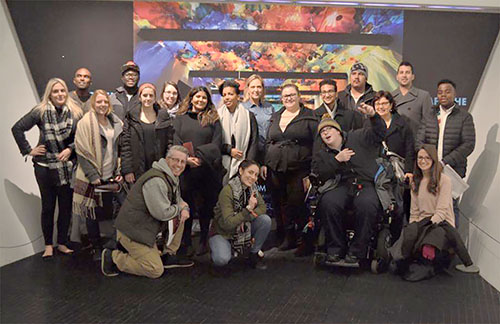
Our Process
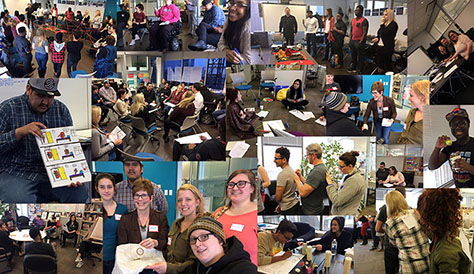
For our panel process to be successful, it was first necessary to establish a trusting and accepting community so that all members felt safe to share their unique lived experiences and insights. We spent time engaging in community building activities, ceremonies and sharing meals to build trust and relationships with one another. This focus on building positive relationships with one another and the adult allies from the participating organizations allowed us to work effectively together. It is our view that the panel process is a reflection of how residential service providers should form relationships: through youth-adult partnerships that emphasize mutuality.
Our process was grounded in the United Nations Convention on the Rights of the Child (UNCRC). Specifically, Articles 4, 12, 17 and 31.
-
Article 4: The government has a responsibility to make sure your rights are protected. They must help your family to protect your rights and create an environment where you can grow and reach your potential.
-
Article 12: You have the right to give your opinion, and for adults to listen and take it seriously.
-
Article 17: You have the right to get information that is important to your well-being, from radio, newspaper, books, computers, and other sources. Adults should make sure that the information you are getting is not harmful, and help you find and understand the information you need.
-
Article 31: You have the right to play and rest.
With these articles in mind, our weekend panel meetings start and close with ceremonies grounded in Indigenous culture. We engage in community building activities so that we can reconnect to each other and the work that we have to do. These activities have also been used to re-energize the group as we often have very long days and sharing our experiences can be emotionally tiring.
Our process has also been centred around a mix of small group and large group work. A variety of diverse methods have been used to gather our voice: spoken word, written word, art, poetry, and other creative methods.
We have been focused to date on providing input to MCYS on their Blueprint. We have explored three key themes: Quality of Care, Continuity of Care and Youth Voice. Our input into these themes has been organized into six key domains. Each domain includes elements that define and describe the domain.
We conducted regional outreach in Windsor where we engaged young people with experience in the residential care system. We learned that the issues we discussed were similar to what they were experiencing. We acknowledge that more regional outreach sessions could have been completed. We also want to reiterate that more work needs to be done to engage Youth in the Justice Facilities.
This report is a summary of our work from the past six months and of input we’ve contributed to the Blueprint. It is our hope that this report will convey the work we’ve done, and more importantly, the critical changes that need to be made to improve young people’s experience in residential care in Ontario. Our process now shifts into a new phase: implementation. We will spend the next months working together and with our intergenerational partners to define how we implement #Fundamental Change in this province.
“Being in care can be like being a Purolator box. You get shipped around, your box may get damaged and you run out of ‘postage’ at 18. Then you may be stuck wherever your box was sent.”
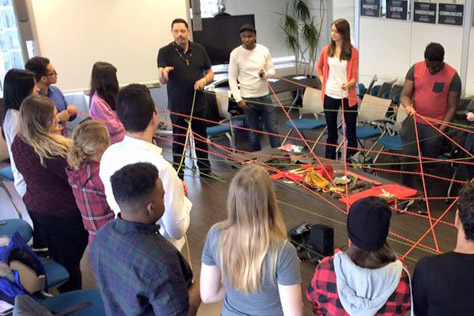
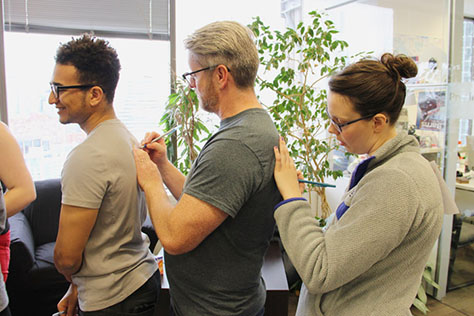
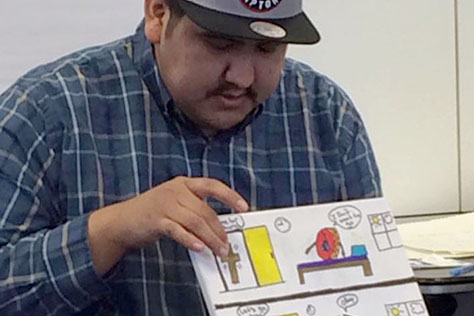
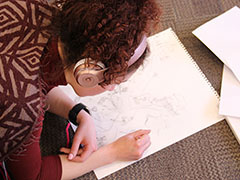
Our Domains
The purpose of the domains is to demonstrate the most important areas of quality of care identified by the panel members. These six domains provide an overview of the key elements that must be visibly, reliably, and consistently present in the lives of young people in residential care at all times. These domains will ensure that the experience in care is a positive one. There are “look fors” listed next to each key element that provide examples for how the quality of care being provided for children and youth can be measured. These “look fors” may seem obvious and simple, but they are essential elements that every young person needs to thrive. These domains come from lived experiences, and are what we wish we had.
Please note that the “Look Fors” highlighted in red are additions from the adult reference group that also supports MCYS. We have included them here and kept them highlighted so you can clearly identify our voice and the voice of the adult reference group.
Voice, Rights and Communication
Access to the Internet and Technology
Look fors
-
Developmentally appropriate access to devices and the internet where available
Our Rationale
-
A necessity for youth in the 21st century
-
Crucial for providing feedback on services and having their voices heard
-
-
Internet standards for all out-of-home care settings
-
Tech-based solutions are used to gather child/youth feedback regarding placements
-
Device/Technology budget for each youth
-
Providing information to children/youth use technology in a safe and appropriate way
-
Technology to meet the needs based on ability (accessibility)
Voice and Choice Resulting in Action
Look fors
-
Adult allies provide the safe space and supports for children and youth to be heard. Articulate their concerns, have these documented and receive a response that is also documented.
-
Youth councils in care facilities are established and supported
-
Open communication that allows young people to use language that is comfortable to them to speak frankly is encouraged at all stages.
-
Concept of right to “pass or play” must be understood by all (e.g. participation in cultural activities)
-
Enhanced requirements and support for youth involvement in governance, development of rules, routines, etc.
-
Feedback from children and youth in out-of-home care is gathered periodically by service providers and action is taken, paying special attention to voices that have been missing or marginalized in the past
-
Exit interviews for all youth after leaving or transitioning from an out-of-home care setting, carried out by a representative from the service setting and a representative from the placing agency, with documentation signed off by the youth and placed in the youth file.
-
Requirements to follow up with youth and demonstrate action taken based on survey/data results
-
Balance listening to voice and choice with the longer-term plan for the child/youth
-
Follow-up with the child/youth before taking action; youth are part of deciding the course of action
Understanding and Upholding the Rights of Children and Youth
Look fors
Children and youth understand their rights and entitlements
Youth-centred methods of engaging youth/children in understanding their rights are created in partnership with young people. These can include:
-
Developing a certification course for youth on their rights
-
Developing a Residents Bill of Rights
-
Providing a poster chart of entitlements for each age group
-
Everyone involved in the provision of care understands and protects the rights of children and youth, paying special attention to gender, racial, and cultural rights
-
Training for service providers
-
Consider that opportunity for voice/rights may be different for children and youth in youth justice and/or mental health settings
-
Calls from the Advocate’s (or MCYS) office to chat about rights and entitlements (within a certain timeframe)
-
Verification of young people’s understanding of rights through random phone interviews with OPACY or MCYS, covering each service provider at a minimum of once per year.
-
Have an actual person responsible for ensuring children and youth know their rights in each type of setting
-
Keep checking in about rights
-
Effective reinforcing
-
Ages and stages
Complaints Mechanisms
Look fors
-
Each home has a clear process for children and youth when they have a problem, concern or complaint (including: timelines and appropriate “levels”)
-
Complaint process is safe and accessible to all young people
-
Each child or youth is aware of other options available for raising complaints and can sign off on solutions
-
The role of OPACY is explained and posters are posted in a visible place
-
Youth perspective included on Serious Occurrence Reports (SORs)
-
Follow-up / update after a complaint or serious occurrence
-
Service providers to forward a summary of complaints and responses to such complaints to MCYS monthly
“It is hard for youth to express, and don’t feel like they can express their concerns about their residential care. Youth can advocate for themselves but need supports to feel like they can. They need space to feel like they can and will be heard.”
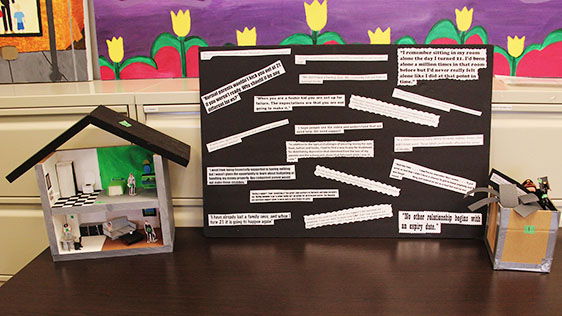
“We need people to care about and love us too. We need foster parents and staff to stop being afraid of getting in trouble if they open up to us or being afraid to tell us that they care and love us. This would have had a huge impact on me and I would have known that I was cared about and loved if they were able to instead of feeling alone.”
Homes and Ongoing Support
Informed Placement Decisions
Look fors
-
The child/youth’s needs are assessed professionally and through dialogue with the child/youth prior to placement
-
The child/youth gets the right diagnosis as early as possible so they can get the right treatment. The youth has a right to more than one opinion.
-
The child/youth is supported to stay at home (if possible) with kin, other people or in a safer environment in order to do a needs assessment
-
Assessment homes are safer and are only short-term
-
Children/youth and other important individuals are actively involved in making placement decisions. They know what they want, and especially what they don’t want
-
Placement decisions are based on a matching of need of the child/youth and the program offered, as well as the needs of the children/youth already in the home young people are provided information about the nature of the program, its rules and routines, and data about the quality of care at that program prior to further steps being taken.
-
Careful consideration around capping ratios for 1:1 care in a setting
-
Placements are made as close to or as far away from the child or youth`s home community as necessary; where placements are far away, the placement agency must provide a rationale that is documented and that includes the perspectives of the young person and their family/important relations and placed in the young person’s file.
-
Opportunity to visit a placement prior to moving there, when appropriate
-
All forms of “family” are considered before or when placing a child or youth
-
Service providers and caregivers get appropriate training, matched to the needs of the child/youth
-
Program/licensing information is validated and publicly available, including the treatments available and the performance of such treatments in the past
Continuity of Care
Look fors
-
Services and supports are coordinated between sectors (e.g., mental health supports, education) - which avoids having to retell your story, while respecting confidentiality and privacy
-
When a child/youth needs extra supports while in out-of-home care, they are provided those supports without having to move, unless it is in the best interests of the child/youth
-
Child/youth is heard/has a choice in terms of any other supports that are needed
-
Appropriate and consistent services and supports are available and be accessed immediately if needed (e.g., provincial rules for everyone to follow)
-
There is an individual at each point in time that is responsible for the coordination of care for a child/youth
-
Child/youth pathways through care, including all relevant systems and sectors, are tracked independently from service providers or case managing agencies and held by MCYS.
-
Placement changes are made as rarely as possible
Supported Transitions
Look fors
-
Planning for known transitions (e.g., into adulthood, back to home) begins as early as possible, but always with a view of allowing young people to feel safe and stable in their current circumstance. Embed the planning in everyday experiences
-
Children/youth are supported to develop the skills and gain the resources needed to live independently (which they identify)
-
The child/youth and other important individuals are actively involved in preparing for all transitions
-
Transition planning includes identifying and supporting access to services as an adult, and specifically to the development of a social network for young people post-discharge
-
There is follow-up at short, medium and longer-term intervals with the child/youth after a transition occurs
-
The child/youth’s worker, or other important individual, as identified by the youth is physically present during transitions
-
Service providers/caregivers are required to indicate whether a transition has been discussed with the young person in advance in a meaningful way. If not, why and how is it documented
-
It is the responsibility of those in charge of care to support transitions, not the family or others
-
No police escorts when moving, unless safety is a consideration
-
Ensure the child/youth has what they need before they move (e.g., winter clothing if moving North) including the costs and resources necessary to move from one place to another (no garbage bags for belongings)
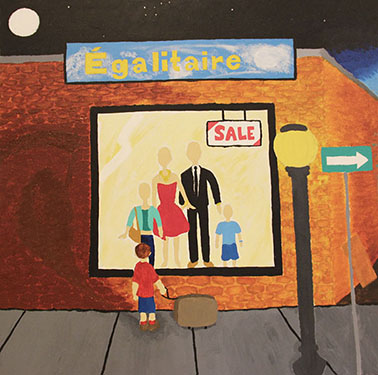
“Quality of Care means dignity. Why are things locked up in residential care such as toilet paper or fridges? There is no dignity in having to ask for these basic needs to be unlocked.”
“It is about young people having say in how their lives are lived, and having the ability to change this.”
Individual Paths and Fulfillment
Individualization
Look fors
Develop goals with young people that are individual and specific to the child or youth (frequently revisit goals)
Do not infantilize youth. This leads to unsuccessful goals because the goals set initially were not relevant
Having access to all programs available – having all the information
Workers to help youth with resume building and finding employment
Provide individualized support like homework help when necessary, or requested by the young person
Provide appropriate amount of structure to each child/youth as an individual. Balance structure provided to each child/youth with opportunities for exploring autonomy and self-determination based on individual strengths and competencies of each child/youth.
Plans While in Out-of-Home Care
Look fors
-
Engage children and youth fully in the development and implementation of their plans, ensuring the process is individualized to each child/youth; reflects the young person’s strengths and a process that is comfortable, meaningful and frequent.
-
Plans need to reflect specific interests and goals
-
Children/youth are involved in the things that interest them (e.g., learning languages, sports)
-
Increase transparency re: what funding is available to youth (e.g., allowances, gifts) and other social or assistance programs
-
Mentorship would be ideal
-
Need a network of people to support plan of care/goal planning
-
Evidence of collaboration with the child/youth’s school or school board
-
Monthly reviews with youth
Life Skills
Look fors
-
Learning the life skills youth want to learn; where possible involve young people who have mastered particular skills in the mentorship to ensure relevance for young people.
-
Resource on the development of life skills for youth for service providers and caregivers, developed by young people with the support of adult allies.
-
Youth to begin learning these skills earlier to support transitions out of care
-
Media/tech literacy and safe device use
Outcomes
Look fors
-
Individual achievements are documented and celebrated
-
Feedback is received from children/youth on the overall outcomes achieved through the out-of-home care placement
-
Negative outcomes are captured and discussed
-
Individual outcomes are defined by the youth (but services also provide constant encouragement to succeed)
-
Opportunities need to be given to youth at all available chances to ensure positive outcomes
-
Education planning and preferences should be respected
Engage children and youth fully in the development and implementation of their plans, ensuring the process is individualized to each child/youth; reflects the young person’s strengths and a process that is comfortable, meaningful and frequent.
Plans need to reflect specific interests and goals
Children/youth are involved in the things that interest them (e.g., learning languages, sports)
Increase transparency re: what funding is available to youth (e.g., allowances, gifts) and other social or assistance programs
Mentorship would be ideal
Need a network of people to support plan of care/goal planning
Evidence of collaboration with the child/youth’s school or school board
Monthly reviews with youth
Learning the life skills youth want to learn; where possible involve young people who have mastered particular skills in the mentorship to ensure relevance for young people.
Resource on the development of life skills for youth for service providers and caregivers, developed by young people with the support of adult allies.
Youth to begin learning these skills earlier to support transitions out of care
Media/tech literacy and safe device use
Individual achievements are documented and celebrated
Feedback is received from children/youth on the overall outcomes achieved through the out-of-home care placement
Negative outcomes are captured and discussed
Individual outcomes are defined by the youth (but services also provide constant encouragement to succeed)
Opportunities need to be given to youth at all available chances to ensure positive outcomes
Education planning and preferences should be respected
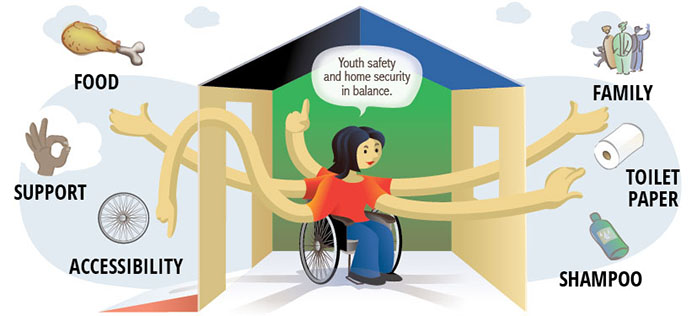
Belonging, Relationships and Accepting Environments
Sense of Belonging
Look fors
-
Children/youth have the opportunity to be included in planning for and executing day-to-day activities (e.g., grocery shopping)
-
Every child/youth in out-of-home care is supported to develop a record of their life experiences
-
Children/youth are connected to their wider community by having access to individually relevant resources/services/opportunities
-
Children/youth are able to decorate their space with personal items and paint their room (within reason)
-
Children/youth are provided with high quality furnishings, mattresses, bedding and hygiene products that reflect their individual preferences
-
Recreational equipment is contemporary and in good working order, and libraries, games, etc. reflect contemporary standards and trends
-
Children/youth are able and supported to attend regular life events (e.g., prom, graduation)
-
Out-of-home care settings have “safe spaces” and display the safe space triangle
-
Children and youth have a right to privacy and a private space
Respect and Dignity
Look fors
-
Children/youth feel respected by staff/caregivers and other children/youth in whichever out-of-home care setting they are in
-
Children/youth are treated as unique individuals
-
Children/youth have independent access to essential items (e.g., food, toilet paper, etc.) and are not restricted for disciplinary reasons; household items, food, and other regular household equipment is not locked and there are no access barriers for youth through rules or routines, if there is a safety issue and restrictions are place on personal items or food that the restriction should be documented
-
In group care, meals are prepared and consumed at one table by youth and staff together; outside food for staff is not permitted
-
Children/youth have access to a personal space and personal belongings, without limitations
-
Youth has freedom and autonomy, as appropriate. They are able to go as they please, but check in
-
Confidentiality and privacy are respected (i.e., what information is shared with others and when)
-
If mail must be checked, it should be opened with or in front of the child/youth, not behind closed doors
-
When out in public, staff do not wear badges identifying the institution to which they belong (which is stigmatizing)
Meaningful Relationships
Look fors
-
Wherever possible, policies/procedures do not stop the development of meaningful relationships (e.g., with peers, staff, family, etc.)
-
Family/friend visits are not a privilege that can be taken away. If there are restrictions, it is clear why and it is documented. Young people can appeal such restrictions.
-
The child/youth has the opportunity to identify and foster the meaningful relationships in their life, especially throughout transitions
-
Children/youth are given time to develop connections and relationships in new settings
-
Birth sibling and family relationships are encouraged (where appropriate) and family visits are a priority
-
There is a warm and caring environment where people smile and ask about your day
-
Positive reinforcement and praise is given to the child/youth
Safety and Accessibility
Look fors
-
Children and youth feel safe in their home and know where to turn to if they don’t
-
The home meets the accessibility needs of the children and youth
-
Necessary safety measures are implemented in dignified and respectful manner (e.g., more respectful form of “suicide watch”)
-
Children/youth are shown how to cope positively. No limits are put on positive coping strategies and young people are active contributors to identifying their individual coping strategies
Transparency of Rules/Procedures
Look fors
-
Service providers/caregivers discuss the rules/expectations in the setting with the child/youth and explain why certain rules are in place
-
Service providers/caregivers work with the child/youth to establish alternate rules where appropriate
-
There is a safe space to negotiate rules/procedures (e.g., meals, plan of care)
-
Children/youth receive an initial, comprehensive orientation and ongoing “check-ins” at their out-of-home placement
-
Less focus on blanket restrictions
-
Household rules are reviewed as part of the MCYS inspection process, with the input from young people
“Giving children their childhood is so important. These things build up self-esteem later in life. Kids in care have to grow up much faster than other kids.”
“Workers tend to over exaggerate every single thing, and attribute it to being a youth in care rather than simply being a youth. As a youth in care, you can’t act up or else it will have consequences for how you are taken care of.”

“My colour is not my culture.”
Identity and Culturally Relevant Care
Self-Identification
Look fors
-
Culture is understood in broad terms, including race, language, faith/religion, gender, sexual orientation, age, ability, etc.
-
Children/youth are able and supported to identify and embrace their chosen culture/identity
-
Children/youth are able to choose whether or not to participate in cultural activities. Children and youth have the right to “pass or play”
-
Service providers and caregivers proactively talk with the child/youth about culture and identity
-
Service providers and caregivers engage and learn with children/youth in residential care about “self-identified” culture
Cultural Respect and Knowledge
Look fors
-
Service providers and caregivers show respect for and are accepting of all cultural differences
-
All service providers have specific comprehensive strategies for identity-affirming practices in particular with respect to Indigenous youth, black youth, trans youth, and youth identifying as LBGTQ2s
-
Service providers and caregivers are given information about the child/youth before placement, including cultural identity, and prepare any necessary accommodation
-
Children/youth are given the space to practice their culture and receive support to do so, when needed
-
Children/youth are provided with information/education about their self-identified culture
-
Service providers and caregivers talk with the children/youth to ask whether their cultural background is being respected and what they can do to support
-
Service providers and caregivers receive training on providing culturally relevant care and the importance of culture/identity (e.g., safe space training)
-
If a child/youth feels that their cultural needs are not being respected, there should be some sort of recourse for them
-
Service providers who regularly serve racialized, African-Canadian, Indigenous and other minority groups are connected to these communities and have members of those communities on advisory councils, board of directors or other governance and advisory bodies.
Connection to Community(ies)
Look fors
-
Children/youth are supported and encouraged to seek/maintain connections with their cultural community(ies), which may include their home community, school, Indigenous elders, religious communities, family members, etc.
-
Service providers and caregivers must be aware of cultural networks to support connections
-
Placement locations are as close to or as far from the child/youth’s home community as appropriate
-
When possible, children/youth have the choice of who to live with, including whether the placement is matched to the child/youth’s cultural/spiritual needs
-
When possible, caregivers and service providers look like the children/youth they care for. If this is not possible, connections to adults that look like the child/youth are fostered

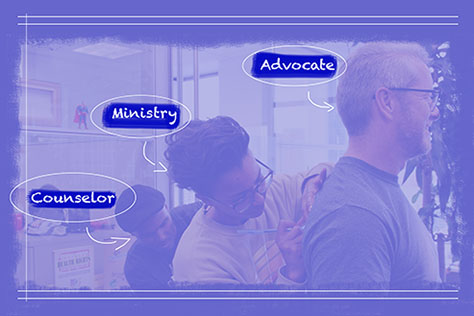
“When I was at camp some kids worried about bed bugs. These experiences make a difference later in life. When I was in care, I was told “if the bed bugs bite, take your shoe and knock them coo-coo.”
Service Providers and Caregivers
Positive Relationships
Look fors
-
Service providers/caregivers support is not triggered by bad behaviour. All children and youth are provided with the opportunity to receive the care and attention they need
-
Unreasonable restrictions are not placed on communication between the children/youth and service providers and caregivers; caregivers have a voice and a say in the way relationships are supported.
-
Service providers/caregivers are supported to develop positive and caring relationships with children/youth (e.g., training, education, etc.)
-
Workers need smaller caseloads to be able to provide more time and attention
-
Children and Youth need some sense of permanency from the staff working with them
-
Strive for organic experiences “What would you do as a parent?”
-
Young people are supported to explore their definition of family at their own pace, and not forced to participate in relationships that make them uncomfortable.
-
Focus on the underlying reasons/issues for child and youth behaviours
Recruitment and Qualifications
Look fors
-
A significant and consistent level of experience/educational qualification is required for everyone working with vulnerable youth
-
Ensure foster parents are fostering for the right reasons – encourage people to become foster parent so that the stigma can be removed (e.g., more racialized caregivers needed)
-
“Hire staff who care”
-
Workforce development strategy needed
-
Specific Indigenous recruitment (e.g., programs and licensing process)- Black communities also
-
Higher pay for staff in this sector
-
Qualifications include staff that are focused on building relationships with children and youth in order to provide a high level of care
-
Consistent staffing model (limit relief staffing, part-time staffing, casual staffing and 1:1 staffing (limit amount of these arrangements))
Training
Look fors
Training on:
-
Child and youth rights
-
Mental health awareness (how to deal)
-
Cultural relevance
-
Diversity and social inclusion
-
trauma-informed practice
-
how to work with and relate to the age group they are working with (not infantilizing youth)
-
Heart and Spirt training (under development)
-
Training also needed on how systems intersect (i.e., child welfare, education, healthcare, even public transit)
-
Opportunities available for training delivered by or with youth where possible
-
Staff in all service settings are trained to encourage the use of positive coping, de-escalation and prevention strategies
-
Physical restraints are used less often. When used, it is as a last resort and upholds the individual’s respect and dignity
-
Law enforcement is called only as a last resort, advocacy against criminalization of behaviour or mental health.
Accountability
Look fors
-
Staff and caregivers to be held accountable for acting and reacting in ways that keep the wellbeing of children and youth at the center and ensure child/youth voices are heard/addressed
-
Shift change-over expectations (i.e., exchange of information on what has happened in the home/setting)
-
More of a client/customer service focus
-
MCYS is accountable for ensuring that service providers hire caregivers, supervisors and others involved and that they are highly qualified based in their education and professional experience (through licensing reviews)

“Understand that life happens. Don’t attribute all my faults or mistakes to being in care. I am still a kid.”
Accountability
Without accountability, we feel that policies are nothing more than words on paper. In our experience, there was often a disconnect between the intention of policies and the care we actually received. During our panel process, we learned that communication between the key players in residential services is often lost in translation. Also, those who occupy higher positions are not properly holding caregivers (e.g., group home staff, foster parents, nurses) accountable for their actions which hinders the assurance that young people are being provided the best care possible.
We strongly feel that a first step in ensuring accountability in residential care is to create a culture in which the voices of young people are listened to and trusted. We also feel that those who occupy higher positions need to ensure that people (service providers) who work directly with young people are providing the best care possible by following up with both the young person and the service provider on a regular basis. Those who work with young people directly need to have a voice and sufficient authority to ensure that their employers don’t create barriers for excellent practices. Everything that is occurring within residential services needs to be examined using a transparent lens, because if people remain unaware about what is actually occurring in residential care, then the fundamental change we seek will never transpire. Finally, we need to assure that every person who plays a role in residential care is striving to continuously improve it because as we have learned, creating change is a process. There must be mechanisms to ensure that youth voice is being continuously accounted for.
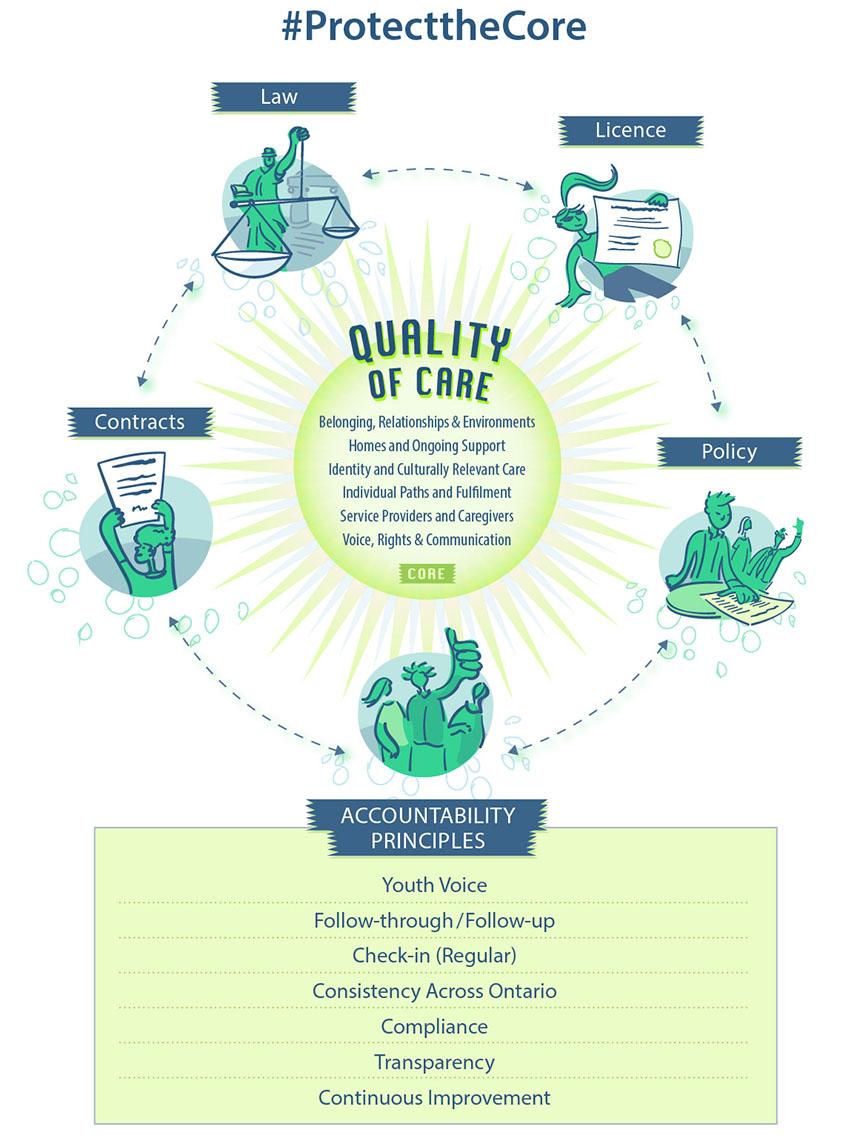
Moving Forward
Our Message: The youth panel does not want the blueprint to sit on the shelf. We want these recommendations to be implemented into policy. We cannot afford any more delays in change. Implementing the ideas discussed within the blueprint will result in positive outcomes for children and youth in their future endeavours.
Studies show that youth in residential care are placed at a greater disadvantage than the rest of the population and face increased difficulty. There are high rates of unemployment, economic hardship, involvement with the criminal justice system, social assistance dependence and lack of education amongst youth who were formerly in care and the ideas presented in this blueprint presents solutions to many of these issues. Regardless of who the Minister of Children and Youth Services is, we want our recommendations to be implemented with urgency and haste. We feel that our countless hours that were put into the creation of this document will go to waste if these Domains and Look fors are not reflected in future policies and regulations.
Children and youth are all different. As a result, they have different experiences and different views. This diversity amongst children and youth needs to be recognized, respected and catered to so that chronically voiceless and marginalized children/youth are able to safely express their views and opinions. Youth who are incarcerated lack opportunities to participate in panels or projects like this one due to restrictions placed on them as a result of their incarceration or involvement with the Criminal Justice system. Therefore, action needs to be taken in order to ensure that government and service providers reach out to this population, and other marginalized groups such as African-Canadian and First Nations youth.
The youth on this panel are dedicated to ensuring that fundamental change to residential services is made. While our panel is committed to being involved in an ongoing manner, we recognize the need for diverse youth and their opinions to be incorporated. This panel only has 12 members, so we acknowledge that we may not be representative of all young people in care in the province. This is why it is extremely important that more opportunities similar to this one are integrated into policy development so that more children and youth can have meaningful input into the decisions that will directly affect their lives. Involvement in this process as panel members has been rewarding and we would like the opportunity to be extended to additional youth who have different experiences (i.e. involvement with youth justice).
We hope that our process of youth engagement through this panel becomes a best practice for government as they draft policies that involve children and youth. We want the government to continuously improve upon this process and provide the opportunity for youth to be involved in similar undertakings.
The panel would like the recommendations and direction put forth in this report and the Blueprint to be disseminated to all of the necessary stakeholders. This includes youth-in-care from across the province and those who provide care to young people. We have been intentional about including creative pieces in this document so that it is engaging for different audiences, especially young people themselves. However, a common theme has been a lack of awareness from young people of their rights and we hope that this blueprint and this document empower young people to understand and exercise their rights. In order to have this occur, a communication strategy needs to be in place. This can include circulation on social media and access online and in print via the Students Commission of Canada and the Office of the Provincial Advocate for Children and Youth.